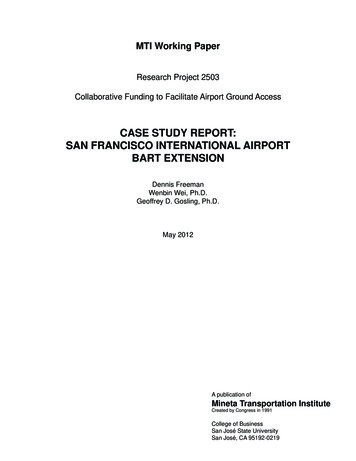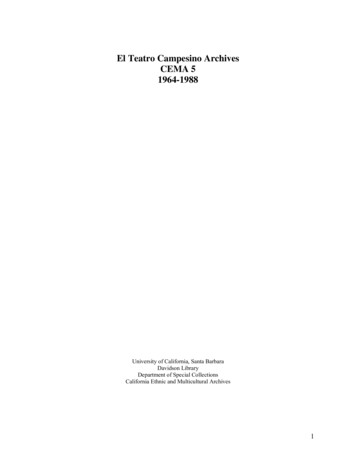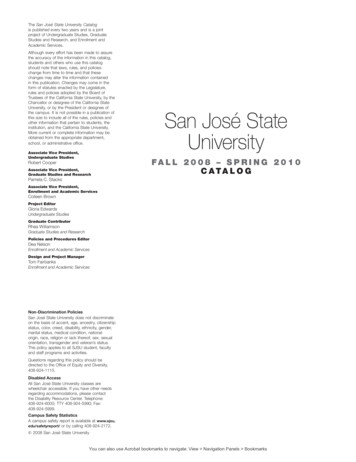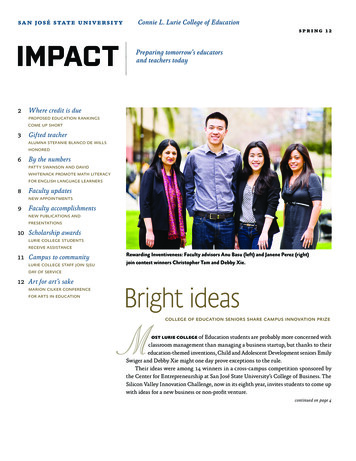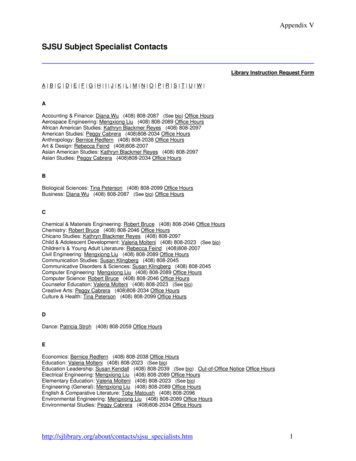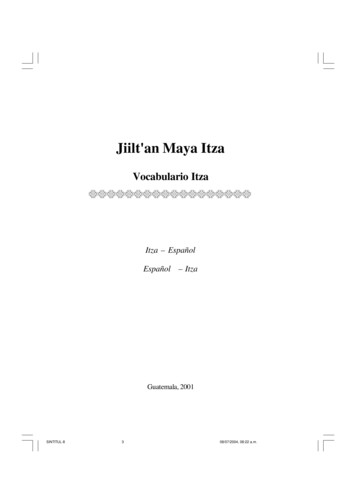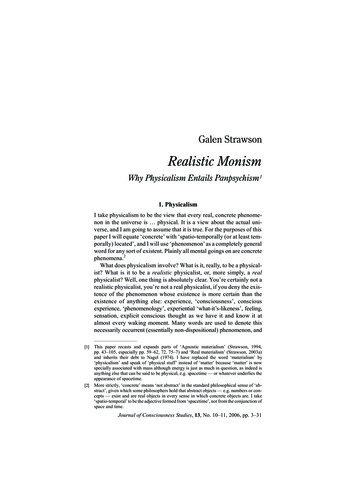
Transcription
Galen StrawsonRealistic MonismWhy Physicalism Entails Panpsychism11. PhysicalismI take physicalism to be the view that every real, concrete phenomenon in the universe is physical. It is a view about the actual universe, and I am going to assume that it is true. For the purposes of thispaper I will equate ‘concrete’ with ‘spatio-temporally (or at least temporally) located’, and I will use ‘phenomenon’ as a completely generalword for any sort of existent. Plainly all mental goings on are concretephenomena.2What does physicalism involve? What is it, really, to be a physicalist? What is it to be a realistic physicalist, or, more simply, a realphysicalist? Well, one thing is absolutely clear. You’re certainly not arealistic physicalist, you’re not a real physicalist, if you deny the existence of the phenomenon whose existence is more certain than theexistence of anything else: experience, ‘consciousness’, consciousexperience, ‘phenomenology’, experiential ‘what-it’s-likeness’, feeling,sensation, explicit conscious thought as we have it and know it atalmost every waking moment. Many words are used to denote thisnecessarily occurrent (essentially non-dispositional) phenomenon, andThis paper recasts and expands parts of ‘Agnostic materialism’ (Strawson, 1994,pp. 43–105, especially pp. 59–62, 72, 75–7) and ‘Real materialism’ (Strawson, 2003a)and inherits their debt to Nagel (1974). I have replaced the word ‘materialism’ by‘physicalism’ and speak of ‘physical stuff’ instead of ‘matter’ because ‘matter’ is nowspecially associated with mass although energy is just as much in question, as indeed isanything else that can be said to be physical, e.g. spacetime — or whatever underlies theappearance of spacetime.[2] More strictly, ‘concrete’ means ‘not abstract’ in the standard philosophical sense of ‘abstract’, given which some philosophers hold that abstract objects — e.g. numbers or concepts — exist and are real objects in every sense in which concrete objects are. I take‘spatio-temporal’ to be the adjective formed from ‘spacetime’, not from the conjunction ofspace and time.[1]Journal of Consciousness Studies, 13, No. 10–11, 2006, pp. 3–31
4G. STRAWSONin this paper I will use the terms ‘experience’, ‘experiential phenomena’ and ‘experientiality’ to refer to it.Full recognition of the reality of experience, then, is the obligatorystarting point for any remotely realistic version of physicalism. This isbecause it is the obligatory starting point for any remotely realistic(indeed any non-self-defeating) theory of what there is. It is the obligatory starting point for any theory that can legitimately claim to be‘naturalistic’ because experience is itself the fundamental givennatural fact; it is a very old point that there is nothing more certainthan the existence of experience.It follows that real physicalism can have nothing to do withphysicSalism, the view — the faith — that the nature or essence of allconcrete reality can in principle be fully captured in the terms of physics. Real physicalism cannot have anything to do with physicSalismunless it is supposed — obviously falsely — that the terms of physicscan fully capture the nature or essence of experience.3 It is unfortunatethat ‘physicalism’ is today standardly used to mean physicSalismbecause it obliges me to speak of ‘real physicalism’ when really I onlymean ‘physicalism’ — realistic physicalism.Real physicalism, then, must accept that experiential phenomenaare physical phenomena. But how can experiential phenomena bephysical phenomena? Many take this claim to be profoundly problematic (this is the ‘mind–body problem’). This is usually because theythink they know a lot about the nature of the physical. They take theidea that the experiential is physical to be profoundly problematicgiven what we know about the nature of the physical. But they havealready made a large and fatal mistake. This is because we have nogood reason to think that we know anything about the physical thatgives us any reason to find any problem in the idea that experientialphenomena are physical phenomena. If we reflect for a moment on thenature of our knowledge of the physical, and of the experiential, werealize, with Eddington, that ‘no problem of irreconcilability arises’.4For a standard argument that this is impossible in principle, see e.g. Strawson (1994),pp. 62–5.[4] Eddington (1928, p. 260); the thought was not new. In the background stood Arnauld(1641), Locke (1681), Hume (1739), Priestley (1777), and many others — see Strawson(2003a, §12). Kant makes the point very clearly, on his own special terms. See e.g. Kant(1781/7), A358–60, A380 and B427–8, where he remarks that the ‘heterogeneity’ of mindand body is merely ‘assumed’ and not known.[3]
REALISTIC MONISM5A very large mistake. It is perhaps Descartes’s, or perhaps rather‘Descartes’s’, greatest mistake,5 and it is funny that in the past fiftyyears it has been the most fervent revilers of the great Descartes, thetrue father of modern materialism, who have made the mistake withmost intensity. Some of them — Dennett is a prime example — are soin thrall to the fundamental intuition of dualism, the intuition that theexperiential and the physical are utterly and irreconcilably different,that they are prepared to deny the existence of experience, more or less(c)overtly, because they are committed to physicalism, i.e. physicSalism.6‘They are prepared to deny the existence of experience.’ At this weshould stop and wonder. I think we should feel very sober, and a littleafraid, at the power of human credulity, the capacity of human mindsto be gripped by theory, by faith. For this particular denial is thestrangest thing that has ever happened in the whole history of humanthought, not just the whole history of philosophy. It falls, unfortunately, to philosophy, not religion, to reveal the deepest woo-woo ofI think that, in his hidden philosophical heart, he did not make it (he is certainly not a ‘substance dualist’ as this expression is currently understood; see Clarke, 2003). Arnauld sawthe problem clearly, and Hume (1739, p. 159 (1.3.14.8)) diagnosed the mistake definitively in two lines, with specific reference to the Cartesians, but the twentieth century —philosophical division — wasn’t listening.[6] Dennett conceals this move by looking-glassing the word ‘consciousness’ (his term forexperience) and then insisting that he does believe that consciousness exists (to lookingglass a term is to use a term in such a way that whatever one means by it, it excludes whatthe term means — see Strawson, 2005). As far as I can understand them, Dretske, Tye,Lycan and Rey are among those who do the same. It seems that they still dream of giving areductive analysis of the experiential in non-experiential terms. This, however, amounts todenying the existence of experience, because the nature of (real) experience can no more bespecified in wholly non-experiential terms than the nature of the (real) non-experiential canbe specified in wholly experiential terms. In the normal case, of course, reductive identification of X with Y is not denial of the existence of X. The reductive claim is ‘X exists, butit is really just this (Y)’. In the case of experience, however, to say that it exists but is reallyjust something whose nature can be fully specified in wholly non-experiential, functionalterms is to deny its existence. ‘But what is this supposed thing you say we’re denying?’ saythe deniers. It’s the thing to which the right reply to the question ‘What is it?’ is, as ever,the (Louis) Armstrong-Block reply: ‘If you gotta ask, you ain’t never gonna get to know’(Block, 1978). It’s the thing whose deniers say that there is no non-question-beggingaccount of it, to which the experiential realist’s correct reply is: ‘It’s question-begging foryou to say that there must be an account of it that’s non-question-begging in your terms’.Such an exchange shows that we have reached the end of argument, a point further illustrated by the fact that reductive idealists can make exactly the same ‘You have no nonquestion-begging account’ objection to reductive physicalists that reductive physicalistsmake to realists about experience: ‘By taking it for granted that the physical is somethingthat can (only) be specified in non-mental terms, you (reductive physicalists) simply begthe question against reductive idealists.’ It’s striking that the realist notion of the physicalthat present-day physicalists appeal to was thought to be either without warrant or unintelligible by many of the leading philosophers of the twentieth century. Many were reductiveidealists about the physical, and Quine famously compared belief in physical objects tobelief in the gods of Homer (Quine, 1951, p. 44).[5]
6G. STRAWSONthe human mind. I find this grievous, but, next to this denial, everyknown religious belief is only a little less sensible than the belief thatgrass is green.7Realistic physicalists, then, grant that experiential phenomena arereal concrete phenomena — for nothing in life is more certain — andthat experiential phenomena are therefore physical phenomena. It cansound odd at first to use ‘physical’ to characterize mental phenomenalike experiential phenomena,8 and many philosophers who call themselves materialists or physicalists continue to use the terms of ordinaryeveryday language, that treat the mental and the physical as opposedcategories. It is, however, precisely physicalists (real physicalists)who cannot talk in this way, for it is, on their own view, exactly liketalking about cows and animals as if they were opposed categories.Why? Because every concrete phenomenon is physical, accordingto them. So all mental (experiential) phenomena are physical phenomena, according to them; just as all cows are animals. So whenphysicalists — real ones — talk as if the mental (experiential) and thephysical were entirely different all they can really mean to be doing isto distinguish, within the realm of the physical, which is the onlyrealm there is, according to them, between mental (experiential)Dennett has suggested that ‘there is no such thing [as] . . . phenomenology’ and that anyappearance of phenomenology is, somehow, wholly the product of some cognitive faculty, the ‘judgment module’ or ‘semantic intent module’ that does not itself involve anyphenomenology. ‘There seems to be phenomenology,’ he concedes, ‘but it does not followfrom this undeniable, universally attested fact that there really is phenomenology’(Dennett, 1991b, pp. 365–6). It is unclear what Dennett means by ‘phenomenology’, butwhatever he means this move fails immediately if it is taken as an objection to the presentclaim that we can be certain both that there is experience and that we can’t be radically inerror about its nature. It fails for the simple reason that for there to seem to be rich phenomenology or experience just is for there to be such phenomenology or experience. To saythat its apparently sensory aspects (say) are in some sense illusory because they are not theproduct of sensory mechanisms in the way we suppose, but are somehow generated bymerely cognitive processes, is just to put forward a surprising hypothesis about part of themechanism of this rich seeming that we call experience or consciousness. It is in no way toput in question its existence or reality. Whatever the process by which the seeming arises,the end result of the process is, as even Dennett agrees, at least this: that it seems as if one ishaving phenomenally rich experience of Beethoven’s eighth quartet or an Indian wedding; and if there is this seeming, then, once again, there just is phenomenology or experience (adapted from Strawson, 1994, pp. 51–2).In denying that experience can be physical, Dennett and his kind find themselves at onewith many religious believers. This seems at first ironic, but the two camps are deeplyunited by the fact that both have unshakable faith in something that lacks any warrant inexperience. That said, the religious believers are in infinitely better shape, epistemologically, than the Dennettians.[8] For purposes of argument I make the standard assumption that while all experiential phenomena are mental phenomena, the converse is not true.[7]
REALISTIC MONISM7features of the physical, and non-mental (non-experiential) features ofthe physical.As a real physicalist, then, I hold that the mental/experiential isphysical, and I am happy to say, along with many other physicalists,that experience is ‘really just neurons firing’, at least in the case ofbiological organisms like ourselves. But when I say these words Imean something completely different from what many physicalistshave apparently meant by them. I certainly don’t mean that all characteristics of what is going on, in the case of experience, can bedescribed by physics and neurophysiology or any non-revolutionaryextensions of them. That idea is crazy. It amounts to radical ‘eliminativism’ with respect to experience, and it is not a form of real physicalismat all.9 My claim is different. It is that experiential phenomena ‘justare’ physical, so that there is a lot more to neurons than physics andneurophysiology record (or can record). No one who disagrees withthis is a real physicalist, in my terms.In a paper called ‘Real materialism’ I considered some objections tothe claim that the position I have just outlined can really be called aphysicalist position. I did my best to answer them and ended concessively, allowing that one might better call the position ‘experientialand-non-experiential monism’ rather than ‘real physicalism’. It is, inany case, the position of someone who (a) fully acknowledges the evident fact that there is experiential being in reality, (b) takes it that thereis also non-experiential being in reality, and (c) is attached to the‘monist’ idea that there is, in some fundamental sense, only one kindof stuff in the universe.The objectors then picked on the word ‘monist’, and I considered afurther concession. You can call my position ‘experiential-and-nonexperiential ?-ism’, if you like, and opt out of the monism-dualismpluralism oppositions of classical metaphysics. Perhaps you can simply call it ‘?-ism’.10 But then you will have to allow that the existenceof experiential being at least is certain, and is not put in question by the‘?’ — so that it would be better to call it ‘experiential ?-ism’. If youthen want to insist, in line with all standard conceptions of the physical, that non-experiential being also exists, then you will also need tosignal the fact that the non-experiential is not put in question by the‘?’. In which case you may as well go back to calling the position ‘experiential-and-non-experiential ?-ism’.This follows from the fact that current physics contains no predicates for experiential phenomena, and that no non-revolutionary extension of it (no currently conceivable extension of it — see note 3) could do so.[10] A suggestion made by Sebastian Gardner, nearly twenty years ago.[9]
8G. STRAWSONI persist in thinking that ‘physicalism’, ‘real physicalism’, is a goodname for my position in the current context of debate, but it’s alreadytime to admit that in my understanding real physicalism doesn’t evenrule out panpsychism — which I take to be the view that the existenceof every real concrete thing involves experiential being even if it alsoinvolves non-experiential being. If this seems a little colourful thenit’s time to read Locke on substance again.11Surely I’ve pushed myself over the edge? How can I say that‘physicalism’ is an acceptable name for my position? Because I take‘physical’ to be a natural-kind term whose reference I can sufficientlyindicate by drawing attention to tables and chairs and — as a realisticphysicalist — experiential phenomena.12 The physical is whatevergeneral kind of thing we are considering when we consider things liketables and chairs and experiential phenomena. It includes everythingthat concretely exists in the universe. If everything that concretelyexists is intrinsically experience-involving, well, that is what thephysical turns out to be; it is what energy (another name for physicalstuff) turns out to be. This view does not stand out as particularlystrange against the background of present-day science, and is in noway incompatible with it.I don’t define the physical as concrete reality, as concrete-realitywhatever-it-is; obviously I can’t rule out the possibility that therecould be other non-physical (and indeed non-spatiotemporal) formsof concrete reality. I simply fix the reference of the term ‘physical’ bypointing at certain items and invoking the notion of a general kind ofstuff. It is true that there is a sense in which this makes my use of theterm vacuous, for, relative to our universe, ‘physical stuff’ is nowequivalent to ‘real and concrete stuff’, and cannot be anything to dowith the term ‘physical’ that is used to mark out a position in what isusually taken to be a substantive debate about the ultimate nature ofconcrete reality (physicalism vs immaterialism vs dualism vs pluralism vs . . .). But that is fine by me. If it’s back to Carnap, so be it.13Have I gone too far? It seems to me that to go this far is exactly theright thing to do at this point in the debate. It’s worth it if it helps us toget back to a proper (realistic) openmindedness. But anyone who prefers[11] Locke (1689), 2.23 and 4.3.6.[12] It’s striking that analytic philosophers and psychologists have talked so much about natural-kind terms but have failed to see that ‘physical’ is a paradigmatic example of such a term inevery sense in which ‘gold’ is.[13] See Carnap (1950).
REALISTIC MONISM9to call my position ‘realistic monism’ instead of ‘real physicalism’should feel free to do so.142. ‘It seems rather silly . . .’This may all seem a little giddy, so I will now rein things in a little bymaking three conventional substantive assumptions about the physical for purposes of argument, using the term ‘ultimate’ to denote a fundamental physical entity, an ultimate constituent of reality, a particle,field, string, brane, simple, whatever:(1) there is a plurality of ultimates (whether or not there is a pluralityof types of ultimates)15(2) everything physical (everything physical that there is or couldbe) is constituted out of ultimates of the sort we actually have inour universe(3) the universe is spatio-temporal in its fundamental nature.16I do not, however, think that I need these assumptions in order to showthat something akin to panpsychism is not merely one possible form ofrealistic physicalism, real physicalism, but the only possible form, and,hence, the only possible form of physicalism tout court. Eddington isone of those who saw this clearly, and I am now going to join forceswith him and ask you to be as tolerant of his terminological loosenesses and oddities as I hope you will be of my appeals to intuition.17One thing we know about physical stuff, given that (real) physicalismis true, is that when you put it together in the way in which it is puttogether in brains like ours, it regularly constitutes — is, literally is —experience like ours. Another thing we know about it, let us grant, iseverything (true) that physics tells us. But what is this second kind ofknowledge like? Well, there is a fundamental sense in which it is[14] It is less certain that there is non-experiential stuff than that there is experiential stuff, andin most ears ‘real physicalism’ signals commitment to the existence of non-experientialstuff in a way that ‘realistic monism’ does not.[15] I believe that cosmology raises serious doubts about (Leibnizian) (1); a powerful rival(Spinozistic) view is that there is at bottom just one thing or substance, e.g. spacetime, orwhatever underlies all spacetime appearances. But (1) does not beg any important questions. If anything, it makes things more difficult for me.[16] This is in doubt in present-day physics and cosmology, for ‘rumors of spacetime’simpending departure from deep physical law are not born of zany theorizing. Instead, thisidea is strongly suggested by a number of well-reasoned considerations’ (Greene, 2004,p. 472; see also pp. 473–91). Note that if temporality goes, i.e. not just spacetimeTM buttemporality in any form, then experience also goes, given that experience requires time.One of the fine consequences of this is that there has never been any suffering. But no theoryof reality can be right that has the consequence that there has never been any suffering.[17] I came upon The Nature of the Physical World in a holiday house in Scotland in 1999.
10G. STRAWSON‘abstract’, ‘purely formal’, merely a matter of ‘structure’, in Russell’swords.18 This is a well established but often overlooked point.19‘Physics is mathematical’, Russell says, ‘not because we know somuch about the physical world’ — and here he means the non-mental,non-experiential world, in my terms, because he is using ‘mental’ and‘physical’ conventionally as opposed terms —but because we know so little: it is only its mathematical properties thatwe can discover. For the rest, our knowledge is negative . . . The physical world is only known as regards certain abstract features of itsspace-time structure — features which, because of their abstractness,do not suffice to show whether the physical world is, or is not, differentin intrinsic character from the world of mind.20Eddington puts it as follows. ‘Our knowledge of the nature of theobjects treated in physics consists solely of readings of pointers (oninstrument dials) and other indicators.’ This being so, he asks, ‘whatknowledge have we of the nature of atoms that renders it at all incongruous that they should constitute a thinking object?’ Absolutelynone, he rightly replies: ‘science has nothing to say as to the intrinsicnature of the atom’. The atom, so far as physics tells us anything aboutit,is, like everything else in physics, a schedule of pointer readings (oninstrument dials). The schedule is, we agree, attached to some unknownbackground. Why not then attach it to something of a spiritual (i.e. mental) nature of which a prominent characteristic is thought ( experience,consciousness). It seems rather silly to prefer to attach it to something ofa so-called ‘concrete’ nature inconsistent with thought, and then towonder where the thought comes from. We have dismissed all preconception as to the background of our pointer readings, and for the mostpart can discover nothing as to its nature. But in one case — namely, forthe pointer readings of my own brain — I have an insight which is notlimited to the evidence of the pointer readings. That insight shows thatthey are attached to a background of consciousnessin which caseI may expect that the background of other pointer readings in physics isof a nature continuous with that revealed to me in this way,[18] Russell (1927a), pp. 392, 382; (1956), p. 153; (1927b), p. 125.[19] It takes time to assimilate it fully. It cannot be simply read off the page.[20] Russell (1948), p. 240; see also p. 247. Russell’s overall view is that ‘we know nothingabout the intrinsic quality of physical events except when these are mental events that wedirectly experience’ (Russell, 1956, p. 153), and that ‘as regards the world in general, bothphysical and mental, everything that we know of its intrinsic character is derived from themental side’ (1927a, p. 402). See Lockwood (1981; 1989), Strawson (2003a).
REALISTIC MONISM11even whileI do not suppose that it always has the more specialized attributes ofconsciousness.What is certain is thatin regard to my one piece of insight into the background no problem ofirreconcilability arises; I have no other knowledge of the backgroundwith which to reconcile it . . . There is nothing to prevent the assemblageof atoms constituting a brain from being of itself a thinking (conscious,experiencing) object in virtue of that nature which physics leaves undetermined and undeterminable. If we must embed our schedule ofindicator readings in some kind of background, at least let us accept theonly hint we have received as to the significance of the background —namely, that it has a nature capable of manifesting itself as mental activity.21This all seems intensely sensible and Occamical. Eddington’s notion ofsilliness is extremely powerful. Why then — on what conceivablegrounds — do so many physicalists simply assume that the physical,in itself, is an essentially and wholly non-experiential phenomenon?I write this and think ‘Do they really?’, and this rapid inner questionis not rhetorical or aggressive, meaning ‘They must be pretty stupid ifthey really think, and think they know, that physical stuff is, in itself,and through and through, an essentially non-experiential phenomenon’. It is, rather, part of a feeling that I must be wrong. I must bedoing what philosophers are famous for doing — setting up strawman opponents who do not really exist while erasing awareness of myreal audience, who will protest that of course they aren’t so foolish asto claim to know that physical stuff is, in itself, in its root nature, awholly non-experiential phenomenon.My next thought, however, is that I am not wrong. It looks as ifmany — perhaps most — of those who call themselves physicalists ormaterialists really are committed to the thesis that[NE] physical stuff is, in itself, in its fundamental nature, somethingwholly and utterly non-experiential.[21] Eddington (1928), pp. 258–60; my emphasis on ‘silly’. It is remarkable that this line ofthought (so well understood by Russell, Whitehead, Eddington, Broad, Feigl and manyothers, and equally, in a number of slightly different guises, by Spinoza, Locke, Hume,Kant, Priestley and many others) disappeared almost completely from the philosophicalmainstream in the wake of Smart’s 1959 paper ‘Sensations and brain processes’, althoughit was well represented by Chomsky (see e.g. Chomsky, 1968, 1995). At this point analytical philosophy acquired hyperdualist intuitions even as it proclaimed its monism. With afew honourable exceptions it out-Descartesed Descartes (or ‘Descartes’) in its certaintythat we know enough about the physical to know that the experiential cannot be physical.
12G. STRAWSONI think they take it, for a start, that ultimates are in themselves whollyand essentially non-experiential phenomena. And they are hardlygoing out on a limb in endorsing NE, for it seems to be accepted bythe vast majority of human beings. I do not, however, see howphysicalists can leave this commitment unquestioned, if they areremotely realistic in their physicalism, i.e. if they really do subscribeto the defining thesis of real physicalism that[RP] experience is a real concrete phenomenon and every real concretephenomenon is physical.For if they are real physicalists they cannot deny that when you putphysical stuff together in the way in which it is put together in brainslike ours, it constitutes — is — experience like ours; all by itself. Allby itself: there is on their own physicalist view nothing else, nothingnon-physical, involved.The puzzle, for me, is that I’m sure that some at least of those whocall themselves physicalists are realistic physicalists — real realistsabout experiential phenomena. Yet they do, I think, subscribe toNE — even when they are prepared to admit, with Eddington, thatphysical stuff has, in itself, ‘a nature capable of manifesting itself asmental activity’, i.e. as experience or consciousness.3. EmergenceIs this a possible position? Can one hold RP and NE together? I don’tthink so, but one defence goes like this:Experiential phenomena are emergent phenomena. Consciousness properties,experience properties, are emergent properties of wholly and utterly nonconscious, non-experiential phenomena. Physical stuff in itself, in itsbasic nature, is indeed a wholly non-conscious, non-experientialphenomenon. Nevertheless when parts of it combine in certain ways,experiential phenomena ‘emerge’. Ultimates in themselves are whollynon-conscious, non-experiential phenomena. Nevertheless, when theycombine in certain ways, experiential phenomena ‘emerge’.Does this conception of emergence make sense? I think that it is very,very hard to understand what it is supposed to involve. I think that it isincoherent, in fact, and that this general way of talking of emergencehas acquired an air of plausibility (or at least possibility) for some simply because it has been appealed to many times in the face of a seeming mystery.22 In order to discuss it I am going to take it that anyposition that combines RP with NE must invoke some notion of[22] Compare the way in which the word ‘immaterial’ comes to seem to have some positivedescriptive meaning although it quite explicitly has none. For a recent helpful taxonomy
REALISTIC MONISM13emergence, whether or not it chooses to use the word. I will start onfamiliar ground.Liquidity is often proposed as a translucent example of an emergentphenomenon, and the facts seem straightforward. Liquidity is not acharacteristic of individual H2O molecules. Nor is it a characteristic ofthe ultimates of which H2O molecules are composed. Yet when youput many H2O molecules together they constitute a liquid (at certaintemperatures, at least), they constitute something liquid. So liquidityis a truly emergent property of certain groups of H2O molecules. It isnot there at the bottom of things, and then it is there.When heat is applied evenly to the bottom of a tray filled with a thinsheet of viscous oil, it transforms the smooth surface of the oil into anarray of hexagonal cells of moving fluid called Bénard convectioncells.23 This is another popular example of an emergent phenomenon.There are many chemical and physical systems in which patterns ofthis sort arise simply from the routine workings of basic physicallaws, and such patterns are called ‘emergent’.This is al
Realistic Monism Why Physicalism Entails Panpsychism1 1. Physicalism I take physicalism to be the view that every real, concrete phenome- . indicate by drawing attention to tables and chairs and — as a realistic physica
